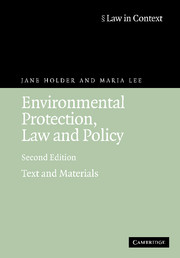Book contents
- Frontmatter
- Contents
- Table of EU legislation
- Table of international conventions
- Table of legislation
- Table of cases
- Acknowledgements
- Preface
- Part I Introduction: Law in Context
- Part II The EU Context
- Part III The International Context
- 6 Sustainable development: quality of life and the future
- 7 ‘Globalisation’ and international trade
- Part IV Mechanisms of Regulation I: Pollution Control
- Part V Mechanisms of Regulation II: Controls Over Land Use and Development
- Index
6 - Sustainable development: quality of life and the future
Published online by Cambridge University Press: 05 June 2012
- Frontmatter
- Contents
- Table of EU legislation
- Table of international conventions
- Table of legislation
- Table of cases
- Acknowledgements
- Preface
- Part I Introduction: Law in Context
- Part II The EU Context
- Part III The International Context
- 6 Sustainable development: quality of life and the future
- 7 ‘Globalisation’ and international trade
- Part IV Mechanisms of Regulation I: Pollution Control
- Part V Mechanisms of Regulation II: Controls Over Land Use and Development
- Index
Summary
Introduction
‘Sustainable development’ has been an enormously influential concept in environmental law since at least the early 1980s. The World Commission on Environment and Development published the seminal work on sustainable development, Our Common Future (more commonly known as the ‘Brundtland Report’, after its chair) in 1987. The Brundtland Report has been built on at an international level, most prominently by the United Nations Convention on Environment and Development (the famous Rio Earth Conference) in 1992, and more recently by the 2002 World Summit on Sustainable Development in Johannesburg. Sustainable development is now extraordinarily widely accepted and supported across the world. We begin this chapter by discussing the evolution of sustainable development through international law. The most widely quoted ‘definition’ of sustainable development comes from the Brundtland Report, according to which sustainable development is development that ‘meets the needs of the present without compromising the ability of future generations to meet their own needs’ (pp. 8 and 43). The Johannesburg Declaration on Sustainable Development provides an alternative in its reference to ‘the interdependent and mutually reinforcing pillars of sustainable development – economic development, social development and environmental protection’ (para. 5), although this three-pillared approach is an evolution of earlier approaches, rather than a break with the past.
Sustainable development has clearly entered the political and academic mainstream, and those interested in environmental law cannot afford to ignore questions of sustainable development.
- Type
- Chapter
- Information
- Environmental Protection, Law and PolicyText and Materials, pp. 217 - 263Publisher: Cambridge University PressPrint publication year: 2007



